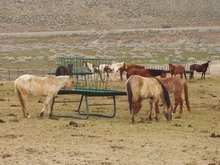Location: SCOTT CITY, Kansas
The Bureau of Land Management (BLM) has launched an investigation into the cause of death for 57 wild horses that were recently transferred to a corral in Scott City, Kan.

Wild horses at a BLM holding site
The Bureau of Land Management (BLM) has launched an investigation into the cause of death for 57 wild horses that were recently transferred to a corral in Scott City, Kan.
© 2014 by Peter Schmalzer
The BLM, which manages 49,200 wild horses and burros on the range and 47,300 in open pastures and corrals, strives to ensure that herd sizes on the range remain in a healthy balance with other public rangeland resources and uses and places a priority on the well-being of the animals in its care.
After removal from the range, the BLM aims to place animals that are not adopted onto open pastures, often in the Midwest. In March 2014, an open-pasture contractor in Kansas informed the BLM that he would not renew his existing five-year contract, requiring the BLM to remove about 1,900 animals (1,500 mares and 400 geldings) by June 1, 2014.
Due to concerns about the older age of many of the animals and the stress associated with being moved, the BLM worked to find an appropriate facility as close as possible to the open pasture. The BLM located an in-state facility that could accommodate the animals and began moving 1,493 mares to the Scott City corral. The transfers were completed on June 22.
On Aug. 5, the contractor informed the BLM that a number of the transferred mares died between June 22 and Aug. 5; as of Aug. 15, a total of 57 transferred mares had died. On Aug. 12, a team of BLM personnel and a veterinarian from the U.S. Department of Agriculture (USDA) Animal and Plant Health Inspection Service arrived on site.
The team is investigating the situation; determining the causes of death; evaluating the facility, the corral feed and feeding practices; and taking actions to support the short- and long-term needs of the horses. After arrival, the team euthanized an additional 13 mares that were determined to have little to no chance for survival due to health issues.
Preliminary findings from the team’s USDA large animal veterinarian indicate that the animals died as a result of their age combined with stress from the recent relocation, the shift from pasture to corral environment and the change from pasture feed to processed hay feed. There is no indication of infectious or contagious diseases being the cause.
“Our team is working closely with the corral operator to make adjustments to the care of the animals,” said USDA veterinarian Dr. Al Kane, who is on the investigation team. “The horses have been fed three times a day since the beginning.
In addition to increasing the amount of feed being offered during feedings, we’ve worked with the onsite veterinarian and the operator to increase the energy density of the horses’ feed by increasing the ratio of alfalfa to grass in the hay mix. This helps support the horses’ nutritional needs during the transition from open-pasture to the corral environment,” he added.
Once the investigation is concluded, the team will complete a report that will be made publicly available.
